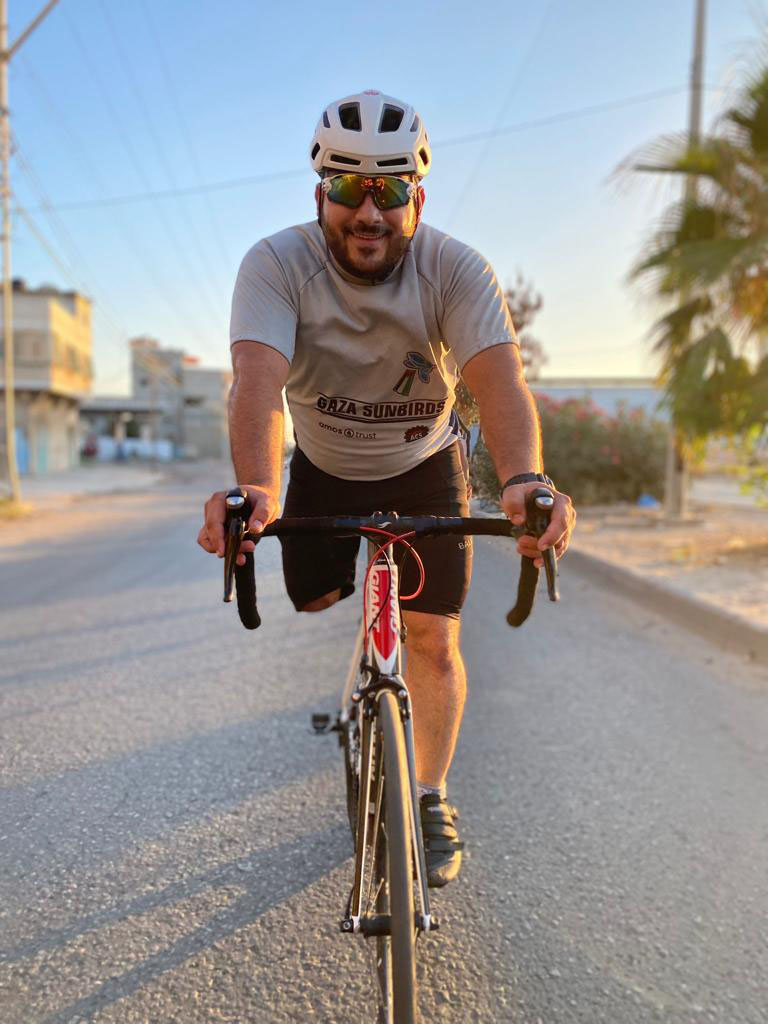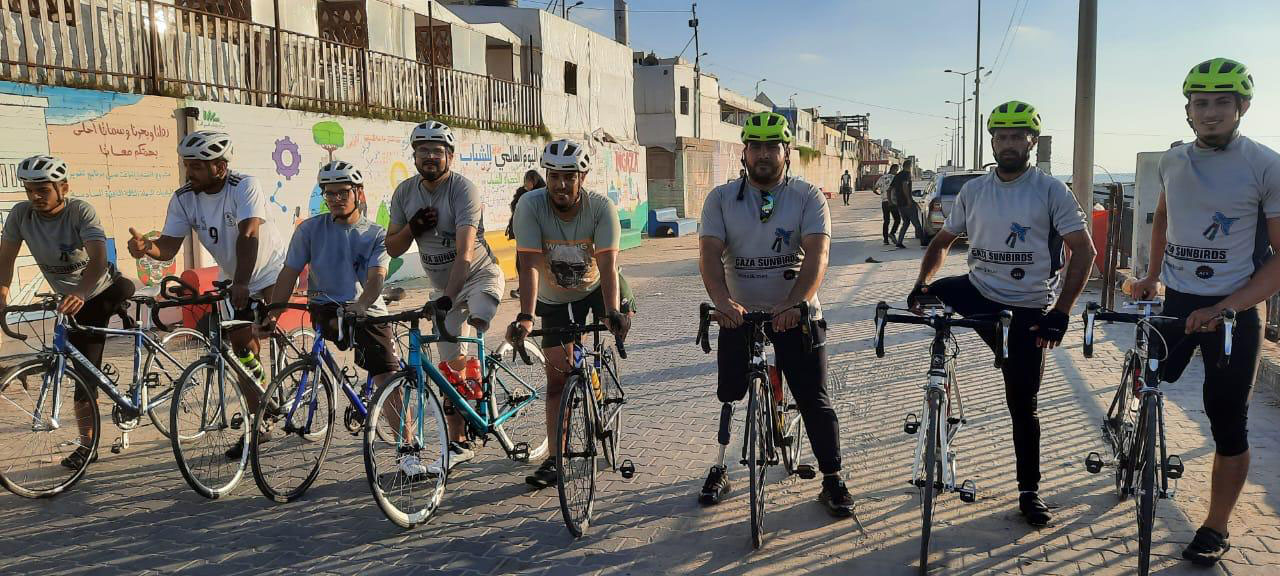Gaza’s professional para-cycling team for amputee athletes rise above Gaza’s darkest days through determination and excellence in sport raising money, and distributing hot meals and sanitary care packages to stricken families suffering under Israeli bombardment.
Malu Halasa
The Instagram video posted by Gaza Sunbirds doesn’t tell the whole story of disabled athletes in the Gaza Strip. In the video, Rafah is being bombed as cyclist Haitham Nasir, 24, rides past city buildings razed to the ground. He like the other 20 members of Palestine’s para-cycling team, ranging in age from 18 to 26, has an amputated leg. On the day of filming, it is the Gaza Sunbirds’ 69th day of riding under siege.
Even though some of the cyclists in Gaza Sunbirds are unable to obtain medicine and have gone without water for up to four days, the para athletes have raised $60,000 and distributed 26 tonnes in food parcels, 7,900 hot meals and 500 maternity and sanitary care packages to stricken Gazan families suffering under continuous Israeli bombardment.
In London, at Amos Trust’s Voices for Gaza, Sunbirds’ 24-year old international coordinator Karim Ali told the story of Ala’a Al-Dali, a cyclist who had been training in Gaza. He had dreams of competing internationally. In 2018, four months before he was to leave for competitive races in Jakarta — and getting the visa to leave the Strip was no mean feat — he joined the March of Return protests of men, women and children on the border between Gaza and Israel, calling for an end to Israel’s blockade of the Strip.
Analysis of data from the UN Office for the Coordination of Humanitarian Affairs by the Guardian revealed that more than 190 people were killed and almost 29,000 Palestinians were injured during the March of Return demonstrations that lasted well over a year. The IDF shot civilians in the legs. Al-Dali was one of these. He joined more than 3,000 other amputees in Gaza, an area that has the highest rate of people with amputated limbs in the world.
Ali explained to the London audience at the Amos Trust event that despite Al-Dali’s situation, the 26 year old refused to give into despair and dared to hope. The Gaza Sunbirds were formed in 2020. The team had been training for the 2024 Para Olympics before the October war. Al-Dali came up with the idea for the Sunbirds to direct their efforts into sourcing and distributing humanitarian aid.

Bread by Bike
Logistics, luck and dedication made the Sunbird’s food program into a reality. Karim Ali, answering questions by email, informed me that once the Sunbirds had been paid “their athlete stipends in advance because of the war, that’s when we realized that the team’s infrastructure was still operational. Shortly after, team captain Ala’a Al-Dali requested us to purchase bread for people in his local community, and it went well. Inspired by his work, our team members and staff followed his leadership in order to save their communities.”
Wheels have given the Sunbirds an edge during wartime, wrote Ali, when it comes to the near impossible task of sourcing food. “The team’s adaptability had them hunting in warehouses and supermarkets to scrape together enough supplies to distribute to their community. When we eventually ran out of canned foods, the team went down the supply chain to farms, which are mainly present in the south of Gaza. To date these farms have still had vegetables, although with recent advancements in the Israeli ground invasion, farmers have been struggling to pick as much food as they normally can.”
Usually donkey or car took the food to the individual athletes, in various locations. There it was stored before the Sunbirds distributed it by bike, leaving it at people’s doors in order “to avoid putting our fellow Gazans in harm’s way,” revealed Ali. Aid was dispersed by cycle around Central Gaza — Nusseirat and Bureij camps — as well as in the south, Khan Younis and Rafah.
“No one,” he admitted, “has been able to make it further north. We are definitely entering a late stage of despair as prices are rising and food is only available in the southernmost parts of the strip, with athletes in Nusseirat and central Gaza informing us that there is simply no fresh produce left to buy.”
Activist Athletes
The Sunbirds are also behind the campaign Athletes for Palestine.
As Ali explained, “Unfortunately with the ongoing genocide, many Palestinian athletes’ dreams of competition and sports excellence have had to be put on pause. The campaign was started as an opportunity for the international athletic community to unite the world through the power of sports and culture, and with a fundamental belief in the strength of athletes to affect change.”
Today approximately 40 Olympic cyclists, para-cyclists, professional skateboarders, professional martial artists, surfers and football teams have joined the campaign and many of these have been getting involved in a variety of ways, including organizing fund raising events. While no professional footballers have officially signed up for Athletes for Palestine, there has been public support for Palestine by big names in sport, such as French professional footballer Karim Benzema, now at Al-Ittihad Club, in Saudi Arabia; the Egyptian forward for Liverpool, Mo Salah; former right winger for Manchester City, now playing for Saudi Arabia’s Al-Ahli Club and the Algerian national team, Riyad Mahrez; and Bayern Munich’s right-back, Noussair Mazraoui who, while born in the Netherlands, plays for the Moroccan national team.
This comes against a backdrop of death, mayhem and destruction, according to a new report by the Palestinian Football Association. Between October 7 and November of this year, 55 Palestinian footballers and other sportsmen have been killed in Israel’s bombardment of Gaza. Palestinian volley-ballers from Al-Sadaka (Friendship) Club — Hassan Abu Zuaiter and Ibrahim Qusaya’a, who had won a bronze medal at the 2021 West Asian Football Federation Beach Soccer Championships and played on the national team in September’s West Asian Games in Hangzhou, China — were killed during the bombing of the Jabalia refugee camp.
The PFA report also cites the destruction of five sports facilities in the Gaza Strip, which makes one wonder if the predominance of Palestinian flags at the 2022 FIFA World Cup in Qatar touched a raw nerve in the IDF.
Sports are not an easy option under occupation, doubly difficult for Sunbirds’ para-cyclists. “The reality is that the team’s life has always been tough on the Gaza Strip,” said Ali. “The very idea of trying to create professional athletes in an open-air prison is super ironic, especially for para-athletes who have to face so many complications living in Gaza. Ultimately we have never been afraid of the impossible and believe that when you break down a task with proper perseverance and commitment, it becomes possible. Despite the fact all of our bikes were wiped out, including our storage facility in the north of Gaza, we are sure we will build back better, stronger and pedaling much faster.”
Another video on the Gaza Sunbird’s Instagram page features competitive Sunbirds’ cyclist Mohammed Abu Asfour. He stands in the ruins of his bombed family home, as he retrieves his helmet out of the rubble. While members of his family fled the bombing on foot, he went on bike because of his disability. When asked if he will keep training, Abu Asfour is resolute. “Absolutely,” he says, “in defiance of anyone’s attempt to shatter our dreams. We will persevere, despite the destruction and sorrow.”
These are the darkest days in Gaza. Unless the international community comes together, this cruel war has no end in sight, with 20,000 Palestinians killed and more than an estimated 50,000 wounded.
Follow the Gaza Sunbirds online, donate, share and be inspired, against what seem at times insurmountable odds.





Inspirational and Informative. Courage and Compassion under horrific terror and violence